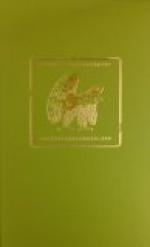“So you dreamed you were fighting it through with me; that’s strange. But I see the story was too hard for you; Feversham shouldn’t have told it.” He paused and his brows clouded. “I wish I could make Weatherbee’s wife dream it,” he broke out. “It might teach her what he endured. I have gone over the ground with her in imagination, mile after mile, that long trek from Nome. I have seen her done for, whimpering in a corner, like the weakest husky in the team, there at the Aurora mine, and at her limit again up in Rainy Pass. And once lately, the night of the club supper, while I was lying awake in my room, looking off through the window to the harbor lights and the stars, I heard her crying deeply from the heart. She did not seem like herself then, but a different woman I was mighty sorry for.”
Miss Armitage turned and met his look, questioning, hardly comprehending. “That sounds occult,” she said.
“Does it? Well, perhaps it is. But a man who has lived in the big spaces has his senses sharpened. He sees farther; feels more.”
There was a silent moment. The colts, topping a low dune, felt the pressure of the fills on the down-grade, and the nigh horse broke, turning the front wheel into a tangle of sage. “Mr. Tisdale,” she cried a little tremulously, “do you think this is a catboat, tacking into a squall? Please, please let me drive.”
Her effort was supreme. It relieved the tension, and when the change was made, she drew to the edge of the seat, holding her head high like that intrepid flower to which he had compared her.
“You mean,” she said evenly, “the terrible silence of your big spaces keys up the subjective mind. That, of course, was the trouble with Mrs. Barbour’s husband. He allowed it to dominate him. But a man like you”—and she gave him her swift, direct look, and the shadow of a smile touched her mouth—“well-balanced, strong, would have kept the danger down. I should never be afraid—for you. But,” she hurried on, “I can understand too how in the great solitudes some men are drawn together. You have shown me. I did not know before I heard your story how much a man can endure for a friend—and sacrifice.”
Tisdale looked off over the desert. “Friendship up there does mean something,” he answered quietly. “Mere companionship in the Alaska wilderness is a test. I don’t know whether it’s the darkness of those interminable winters, or the monotony that plays on a man’s nerves, but I have seen the closest partners get beyond speaking to each other. It’s a life to bring out the good and the bad in a man; a life to make men hate; and it can forge two men together. But David Weatherbee never had an enemy. He never failed a man. In a crisis he was great. If things had been reversed”—he set his lips, his face hardened—“if Weatherbee had been in my place, there at Nome, with a letter of mine in his hands, he wouldn’t have thrown away those four days.”




